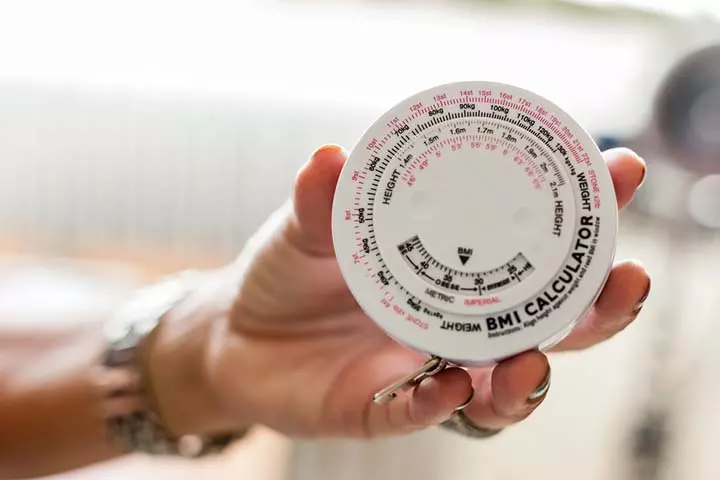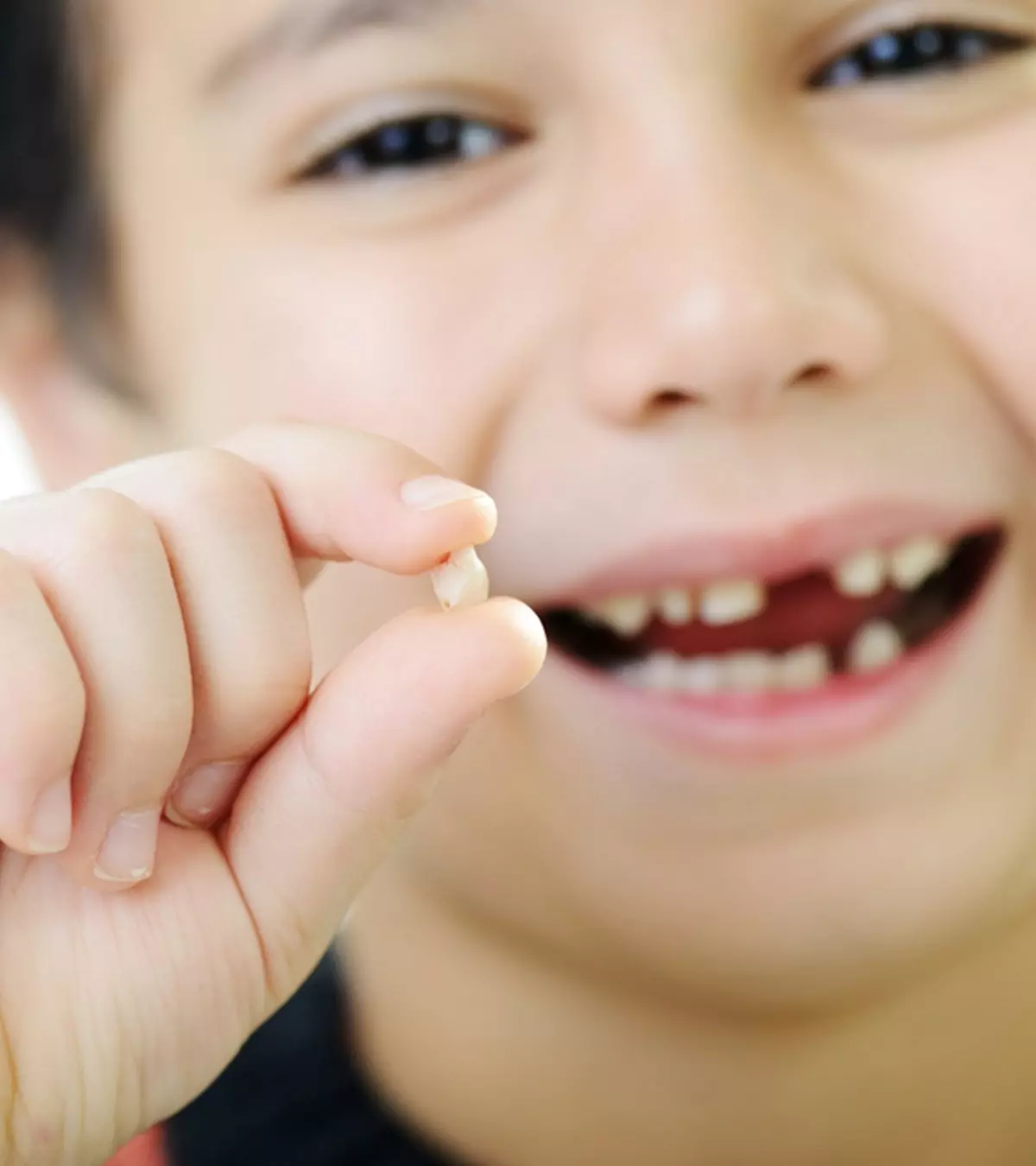
Image : Shutterstock
Teenagers acquire weight gradually as they mature. Although a healthful increase in weight is necessary, excess weight gain in teens and the accumulation of additional calories might be concerning. The most prevalent causes of significant weight gain in teenagers are a poor diet and a sedentary lifestyleiA pattern of living characterized by sitting, lying down often, with little or no physical activity , including a lack of physical activity. However, hormonal changes during adolescence and an underlying medical condition in a few cases can also induce a sudden increase in weight in teenagers. While teenagers need to keep excessive weight gain in control, they should not deprive themselves of the regular weight increase that is necessary for their healthy development. Dive into this post as we discuss the appropriate weight gain for teens, some common reasons for excessive weight gain or adolescent obesity, and what can be done to maintain a healthy weight in teens.

Key Pointers
- A poor diet and a sedentary lifestyle are key factors behind excessive weight gain in teenagers. However, hormonal imbalances and underlying medical conditions could also be responsible.
- The ideal weight of a teenager can be measured by using the BMI calculator which considers the child’s height and age to determine the weight.
- Factors such as puberty, psychological reasons, health reasons, and certain medicines may contribute to a child gaining weight, apart from a poor diet and lack of physical activity.
- Consult a doctor if your teen is gaining weight due to binge eating or if weight gain seems to have begun after a particular medication, or if their body develops abnormally high deposits of fat around the neck, face, and abdomen.
What Should Be the Ideal Weight of Teens?

To determine the ideal weight of the teen, you need to consider several factors besides their age.
- The US Center for Disease Control and Prevention (CDC) and the American Academy of Pediatrics recommend the use of a BMIiA calculation of weight relative to height that assesses body fat and determines if a person is at a healthy weight calculator to determine if a teen has normal weight, overweight, or obese (1).
- The BMI calculator considers the height and age of the teenager in determining their weight threshold.
- Body Mass Index for teens is interpreted differently, which is why you should refer to a BMI chart, such as the one developed by the CDC, standardized for children.
- The CDC says, “Because there are changes in weight and height with age, as well as their relation to body fatness, BMI levels among children and teens need to be expressed relative to other children of the same sex and age (2).” Therefore, the weight of a teen is evaluated in comparison to other teens and is assigned as a percentile.
- The minimum is the 5th percentile, and the highest is the 95th percentile. When the teen’s BMI is equal to or greater than the 95th percentile, they are considered obese since it means the teen’s weight is greater than 95% of teens.
 Experts say
Experts sayUltimately, the teen’s BMI score on the percentile chart will determine whether they are of a healthy weight or fall within the bracket of overweight teenagers.
Key takeaways
- Use a BMI calculator to determine a teen’s weight category based on their height, age, and gender.
- Refer to standardized BMI charts, like those by the CDC, to interpret results accurately for teens.
- A teen’s BMI is compared with peers of the same sex and age and assigned a percentile, with the 95th percentile indicating obesity.
BMI Percentile Table and Weight Status
| Percentile Range | Weight Status |
|---|---|
| Less than the 5th percentile | Underweight |
| 5th percentile to less than the 85th percentile | Normal or healthy weight |
| 85th to less than the 95th percentile | Overweight |
| Equal to or greater than the 95th percentile | Obese |
Source: US Centers for Disease Control and Prevention
BMI Calculation and CDC Charts
You can calculate the BMI of the teen using the following formula:
- Weight (kg)/ (Height in meters x Height in meters)
- (Weight (lb) x 703)/ (Height in inches x Height in inches)
Round off the number to one decimal place. For example, 22.554 becomes 22.5.
You can calculate the BMI of your child and plot it on the chart right at home:
 Point to consider
Point to considerWhat Causes Excess Weight Gain In Teens?
Here are a few reasons that contribute to excess weight gain in teenagers (3).
1. Eating unhealthy food

- A study published in The Journal of Nutrition suggests that consuming snacks is a risk factor for an unhealthy diet (4). This is particularly common when teens feel “bored” and go every now and then to the kitchen or the refrigerator looking for food that makes them feel better.
- Teens are likely to gain weight if they eat high-calorie, low-nutrient fast food even if they have a nutritious diet at home.
- Access to junk food combined with the freedom that their pocket money gives them can also result in building unhealthy eating habits. Regular binge eating of fast foods and processed foods can lead to weight gain.
- Teens could get easily inspired by fad diets and other food-related social media trends that encourage excessive eating in a short duration. These actions could lead to unhealthy weight gain.
2. Insufficient physical activity
- Teenagers need to get adequate exercise to stay in good health. When a teen lacks physical activity, then they invariably gain weight. According to the CDC Youth Risk Behavior Survey (YRBS), there was a decline in physical activity and an increase in sedentary behavior among US teenagers between 2011 and 2019. Additionally, in 2019, only 23.2% of teenagers engaged in 60 minutes of physical activity per week, while 46.1% indulged in playing video or computer games for three or more hours daily (5).
- Children who do not eat junk food may also be at risk of putting on over weight if they do not exercise at all.
- Teenagers burn fewer calories when at rest, according to a study (6). The study noticed that 15-year-olds burn 400 to 500 fewer calories per day when at rest, compared to what they did at the age of ten years.
3. Puberty

- Puberty alone may not cause significant or unhealthy weight gain. However, the growth spurtiA brief phase of rapid growth in a child's height and weight tends to cause increased hunger, which may accelerate weight gain in teens who eat in excess and do not get enough physical activity.
- Children in their early teens (13 to 14-year-olds) are likely to gain weight naturally as a result of hormonal changes during puberty. Weight gain may be more prominent among girls (7).
- The child may gain about 6.5 pounds (3 kilograms) in a year after puberty (8).
4. Psychological reasons
Ohio-based physician Dr. Kevin Huffman explains, “Being overweight or obese as a teen often entails numerous psychological difficulties. Teens are highly sensitive to social cues, and being heavy can invite bullying, social isolation, and low self-confidence. This emotional distress can make weight management even more difficult, creating a vicious cycle.”
- The changes in the body make adolescents highly self-conscious and sensitive to their figure. They may unnecessarily compare themselves to their peers and be under pressure to have the “ideal body” (9). The dissatisfaction of not having the perfect body may lead to mental health disorders like depression, which in turn could lead to unhealthy eating habits, eating disorders, and thus weight gain (10).
- Several teens have a flawed opinion that they are fat even when they are not, which could lead to body image issues. In the long run, this could lead to reinforcement of the belief. Some experts state that a teenager’s constant belief that they are fat can lead them to gain excess weight (11).
- Stress and emotional eating are also linked to weight gain. Research suggests that stress and depression can lead to higher consumption of sugary and fat-rich foods (12). Food is quite likely to work as a coping mechanism to alleviate feelings of depression and chronic stress.
Kritika Khurana, a student, shares her story of how stress-induced eating habits caused her to gain weight. She says, “I started gaining weight during my board (exams), and I was so sad with my weight that I stopped going out with family and friends because I never felt good in my skin. As unhappy as I have been with my weight, I ate more just to change my mood and feel better, and as a result, I gained more weight.
“There was a time when I suffered from depression, too. And then my mom came to my rescue. She forced me to go and join a diet clinic. As I started going to the clinic, I started seeing the changes, and my lifestyle changed because I no longer wanted to go back to the same old fat girl I used to be (i).”
5. Health reasons
- Hypothyroidism is a condition where the thyroid gland becomes underactive and produces lesser thyroid hormone, one of the symptoms is an increase in weight (13). The teenager is also likely to feel tired and fatigued most of the time. This is most common in girls, particularly if some other woman in the family has thyroid disease.

- Cushing’s syndrome is a rare medical condition that causes the body to produce an excess of cortisol, which is the stress hormone produced by the adrenal glands (a gland that lies over each kidney). One of the significant symptoms of the condition is weight gain. Accumulation of fat around the base of the neck is another symptom. Children with Cushing’s syndrome tend to become obese and also grow slowly (14).
- Certain medicines can also lead to excess weight gain in teens due to the compounds in them. Sometimes, medications can cause complications that in turn, lead to weight gain. An example is glucocorticoids, which is a type of steroid hormone commonly used in the treatment of immune system disorders like asthmaiA long-term respiratory condition wherein the airways of the lungs become swollen and narrow, resulting in breathing problems and lupusiA chronic autoimmune condition causing inflammation and damage to various body parts . Long-term use of glucocorticoids can cause Cushing’s syndrome, which in turn leads to weight gain.
 Expert says
Expert saysExcessive weight gain can be controlled through changes in lifestyle and diet. But if that doesn’t help, you may have to consult a medical professional.
Key takeaways
- Snacking on junk food, binge eating, and following fad diets contribute to excessive calorie intake.
- Sedentary lifestyles with reduced exercise and increased screen time are common factors.
- Hormonal fluctuations during puberty can increase appetite and cause natural weight gain.
- Stress, depression, body image issues, and emotional eating often lead to weight gain.
- Health issues like hypothyroidism and Cushing’s syndrome, along with certain medications, can result in weight gain.
How Can Parents Help Teens?
Parents may be required to guide their teens toward a healthier lifestyle to prevent obesity and eating disorders. Here are a few ways parents may aid in the management of weight gain in teens.
- Be a role model by practicing healthy eating habits, having a regulated sleep cycle, and exercising regularly. A research study published in the American Academy of Political and Social Science indicates that children are more likely to adopt healthy eating and exercise habits if their parents model these behaviors during their upbringing (15).
- Ensure that the teen spends at least an hour each day biking, skating, or playing any outdoor sport of their choice.
- Restrict the time spent on using electronics such as phones and television for the whole family. Instead, opt for family-oriented activities such as sharing meals to encourage bonding.
- Discourage fast foods, sugary soft drinks, and unhealthy snacking between meals. Instead, have fruits, salads, nuts, sprouts, granola bars, and fresh homemade juices (16)..
- Avoid using food as a reward or punishment to build a healthy relationship with food. Also, encourage chewing thoroughly instead of gulping and eating only when hungry.
Weight gain due to genetic ailments and medications is often beyond the control of the teen and even their parents. While a healthcare provider can provide you with specific approaches to manage weight gain, parents may try the following to reduce the emotional effects of being overweight or obese due to reasons beyond the teen’s control.
- Foster open communication: Provide a supportive and judgment-free environment where teens feel comfortable sharing their feelings and concerns.
- Promote social connections: Encourage group activities or hobbies that align with their interests to build a strong peer network and combat loneliness.
- Teach media awareness: Discuss unrealistic body images portrayed in media, helping teens critically analyze these messages and avoid harmful comparisons.
Whatever the underlying causes, obesity has become more common as children reach adolescence. As shown in the graph below, collected from the National Health and Nutrition Examination Survey of 2017-2018 in the US population, it has been observed that among children ages 2-5 years, more than 1 in 8 (13.4%) have obesity, which increases to more than 1 in 5 (20.3%) in children 6-11 years and more than 1 in 5 (21.2%) among teenagers.

Prevalence of obesity in US children and adolescents aged 2 to 19 years
Source: Overweight & Obesity Statistics; National Health and Nutrition Examination Survey (NHANES)Key takeaways
- Parents should model healthy eating, exercise, and sleep habits to influence their teen’s lifestyle choices.
- Teens should engage in at least an hour of physical activity, such as biking, skating, or playing sports.
- Limiting screen time and encouraging family activities like shared meals can promote healthier habits.
- Parents should discourage unhealthy snacks and instead provide fruits, salads, and homemade juices.
- Using food as a reward or punishment should be avoided, and teens should be encouraged to eat mindfully and only when hungry.
When To Be Concerned About Weight Gain?
Consult a doctor about your teen’s weight gain if:
- The child has extreme weight gain beyond 16 years of age and even towards the end of the teen years (2) (6).
- You sense the teen is gaining weight due to binge eating, which itself may have been caused by constant peer pressure, body image issues, or some other matter that is stressing them out.
- The weight gain seems to have begun after the kid was prescribed medicine. In such a case, talk to the doctor about it.
- The body develops abnormally high deposits of fat around the neck, face, and abdomen. The skin on the abdomen has reddish-pink stretch marks (these are the symptoms of Cushing’s syndrome).

- The child also appears tired, dull and complains of muscle aches.
Key takeaways
- Consult a doctor if weight gain occurs significantly after 16 years or towards the end of the teen years.
- If weight gain is linked to binge eating caused by stress, body image issues, or peer pressure, seek medical advice.
- If weight gain follows medication use or is accompanied by abnormal fat deposits, fatigue, and muscle aches, consult a doctor.
Complications Of Obesity In Teens
Unhealthy weight gain in teens can lead to several complications, affecting their quality of life. Some of the physical complications of obesity in teens include (17):
- Diabetes
- Changes in hormone levels
- Sleep issues
- Pain in joints
- Breathing problems
- Increased risk of cardiovascular diseases
- Increased blood pressure
Apart from the above-listed physical complications, teens with obesity can also face emotional problems including low self-esteem, anxiety, and depression.
Key takeaways
- Obesity in teens can lead to physical complications such as diabetes, sleep issues, joint pain, and increased risk of cardiovascular diseases.
- Hormonal changes and breathing problems are also common in obese teens.
- Emotional challenges like low self-esteem, anxiety, and depression can arise alongside physical health issues.
Frequently Asked Questions
1. What is considered a healthy weight gain in teens?
A weight gain of one to two pounds per week is healthy for teenagers. However, all teens may not follow the same pattern. If the overall weight gain in a month is in the right direction, according to your doctor, there is no need to worry (18).
2. Can a skinny teenager gain weight?
Yes, a skinny teenager can gain weight; however, gaining weight should not be their motive unless suggested by a doctor. At times, in an effort to put on extra weight, teenagers tend to accumulate unnecessary fat in their bodies, which may have adverse health effects. Therefore, teenagers should focus on building a healthy and strong body rather than gaining weight (19).
3. How often should teenagers eat?
A teenager may eat three meals a day with healthy snacks in between. They should include plenty of fiber in their diet and decrease salt and sugar consumption (20).
Hormonal factors and an unhealthy lifestyle with poor diet and nutrition may contribute to excess weight gain in teens. In addition, consumption of unhealthy, fatty foods, junk foods, or excessive intake of calories followed by a sedentary lifestyle may contribute to weight gain. Even puberty and psychological issues are contributing factors. Seek the help of a medical professional for the proper diagnosis of a teenager’s weight gain, which may often be evident by their body mass index (BMI) value. The underlying contributing factors must be considered before forming any interventional strategies for weight management or diet plans for weight loss in teens.
Infographic: Possible Causes Of Abnormal Weight Gain In Teenagers
Teenage weight gain is a typical cause for concern, and various factors might play a role. Knowing the reason behind your teen’s excessive weight gain is crucial, in addition to encouraging them to eat wisely and exercise frequently. See the infographic below to learn about typical reasons for teens’ excessive weight gain. Illustration: Momjunction Design Team
Illustration: Common Causes Of Excess Weight Gain In Teens

Image: Stable Diffusion/MomJunction Design Team
Personal Experience: Source
MomJunction articles include first-hand experiences to provide you with better insights through real-life narratives. Here are the sources of personal accounts referenced in this article.
i. My weight loss journey;https://thatbohogirlblogger.blogspot.com/2014/12/my-weight-loss-journey.html
References
1. Age-based Pediatric Growth Reference Charts; Baylor College of Medicine
2. BMI Frequently Asked Questions; Centers for Diseases Control and Prevention
3. Weight Management and Adolescents; Children’s Hospital Philadelphia
4. Larson, Nicole I., et al.; (2016); Adolescent Snacking Behaviors Are Associated with Dietary Intake and Weight Status; The Journal of Nutrition
5. Youth Risk Behavior Surveillance- United States, 2019; Centers For Disease Control And Prevention
6. Teenage weight gain down to dramatic drop in calories they burn; University of Exeter/Science Daily
7. Baker ER. Body weight and the initiation of puberty; Clin Obstet Gynecol
8. Physical Changes During Puberty; American Academy of Pediatrics
9. Adolescent development; U.S. National Library of Medicine
10. Felton et al., The relation of weight change to depressive symptoms in adolescence; National Center for Biotechnology Information
11. Feeling overweight could make you fat; ScienceNorway.no
12. M Mooreville et al., Depressive Symptoms and Observed Eating in Youth; National Center for Biotechnology Information
13. Underactive thyroid (hypothyroidism); NHS UK
14. Cushing’s Syndrome;U.S. Department of Health and Human Services
15. The Role of Parents in Preventing Childhood Obesity; The American Academy of Political and Social Science
16. Golden, Neville H., et al.; (2015); Preventing Obesity and Eating Disorders in Adolescents; PEDIATRICS
17. Obesity In Children And Teens; The American Academy of Child and Adolescent Psychiatry
18. Healthy Weight Gain for Teens: A Guide for Parents; Young Men’s Health
19. Should I Gain Weight? Nemours Teens Health
20. Healthy Eating During Adolescence; Johns Hopkins Medicine
21. Body-Mass Index (BMI) in Children; American Academy of Pediatrics
22. Obesity In Teens; University Of Rochester Medical Center
Community Experiences
Join the conversation and become a part of our nurturing community! Share your stories, experiences, and insights to connect with fellow parents.
Read full bio of Dr. Miguel Ángel Guagnelli Martínez
- Dr. Kevin Huffman is a doctor of osteopathic medicine and a board-certified bariatric physician. He is the founder of AmBari Nutrition, a platform for weight loss and dieting products. Dr. Huffman has treated more than 10,000 patients over three decades and is the founder & president of the American Bariatric Consultants.
 Dr. Kevin Huffman is a doctor of osteopathic medicine and a board-certified bariatric physician. He is the founder of AmBari Nutrition, a platform for weight loss and dieting products. Dr. Huffman has treated more than 10,000 patients over three decades and is the founder & president of the American Bariatric Consultants.
Dr. Kevin Huffman is a doctor of osteopathic medicine and a board-certified bariatric physician. He is the founder of AmBari Nutrition, a platform for weight loss and dieting products. Dr. Huffman has treated more than 10,000 patients over three decades and is the founder & president of the American Bariatric Consultants. 
Dr. Po-Chang Hsu is a medical doctor and medical content expert. He received his medical degree from Tufts University School of Medicine in Boston in 2016. Previously, he did a master’s degree at Harvard University and wrote a thesis on neuroimaging in schizophrenia patients at Brigham and Women’s Hospital. He currently works at Alpas Wellness.
Dr. Po-Chang Hsu is a medical doctor and medical content expert. He received his medical degree from Tufts University School of Medicine in Boston in 2016. Previously, he did a master’s degree at Harvard University and wrote a thesis on neuroimaging in schizophrenia patients at Brigham and Women’s Hospital. He currently works at Alpas Wellness.
Read full bio of Rohit Garoo
Read full bio of Swati Patwal
Read full bio of Dr. Joyani Das


















